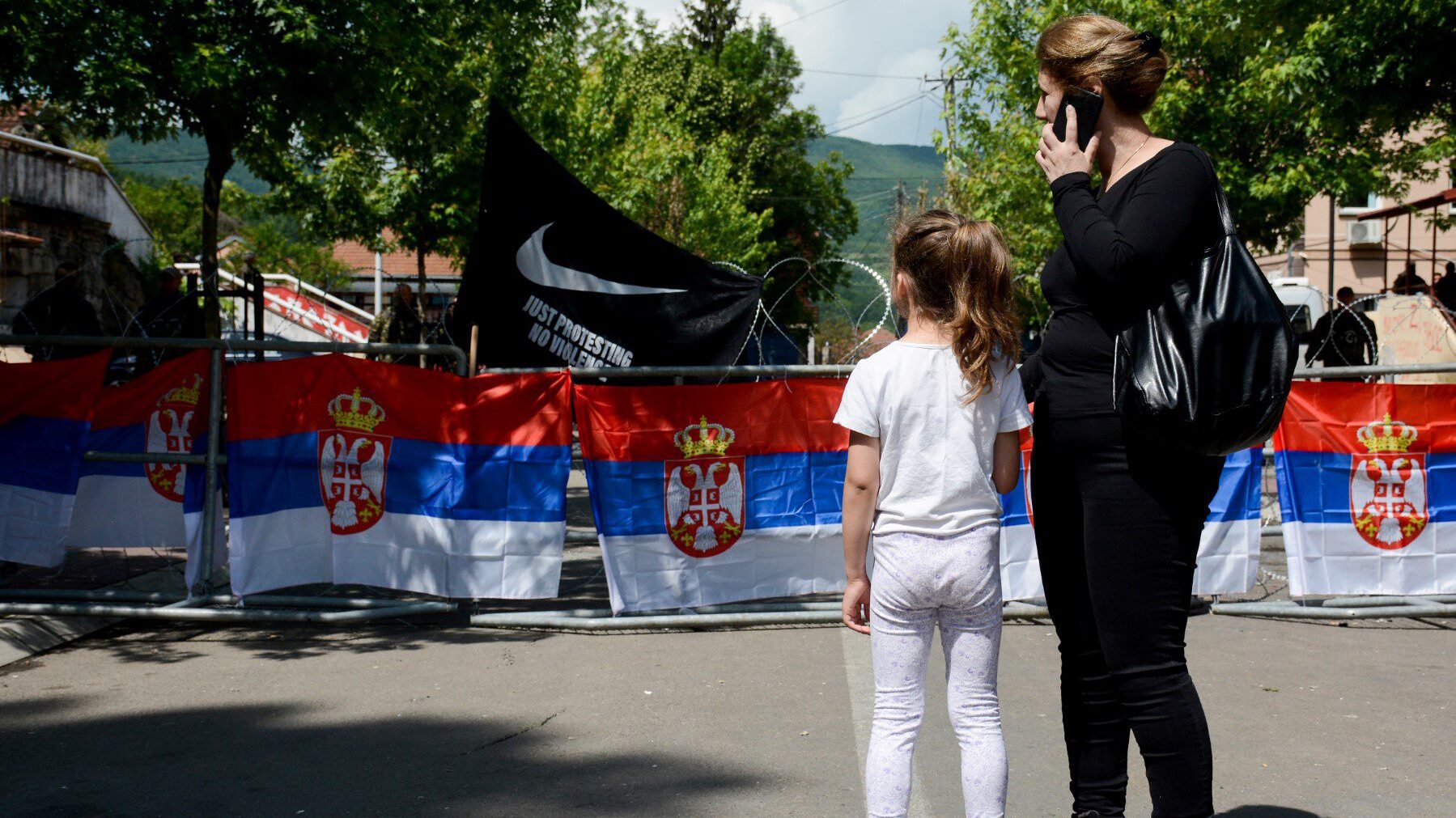
A woman with her child stands outside the Zvečan town hall in northern Kosovo on June 2nd, 2023, as tensions remained high after clashing with NATO-led peacekeepers earlier this week.
Photo: STRINGER / AFP
The U.S. and the EU have put Kosovo on notice over its continued standoff with ethnic Serbs in its northern region. If it does not back down—U.S. and EU envoys warned on Wednesday, June 7th—the country would surely face “consequences,” a not-so-veiled hint at it risking possible NATO and EU membership by not obeying.
The envoys’ joint shot across Pristina’s bow came after they had concluded visits to Kosovo and Serbia to bring calm after last week’s flare-up in violence, when dozens of NATO-led peacekeeping soldiers were injured during fierce scuffles with Serb protesters in northern Kosovo.
Wary of the potential for another conflagration in the Balkans—over 20 years have passed since the end of the Kosovo War—the incident prompted NATO, which stationed around 4,000 troops in Kosovo, to send in an additional 700, which have since started to arrive.
In four municipalities in the northern region, ethnic Serbs came out strongly against ethnic Albanian mayors—who were elected despite a minuscule 3.5% turnout, following a Serb boycott—assuming their duties there. While a minority in the largely ethnic Albanian Kosovo, Serbs constitute the majority in the north.
Serbs in the northern territories do not recognize Kosovo’s 2008 declaration of independence from Serbia. They still view Serbia as their government.
Having met with Serbian President Aleksandar Vučić in Belgrade, U.S. envoy to the Western Balkans, Gabriel Escobar, said that, in the interest of de-escalation, Kosovo should withdraw its police and its ethnic Albanian mayors from these Serb-majority municipalities if it wants to move closer to joining NATO.
Escobar also told reporters there: “If Kosovo wants to move towards Euro-Atlantic integration [a reference to it wanting to join both the EU and NATO] it will have to establish (an association of Serb municipalities),” a reference to the EU-brokered 2013 deal for the creation of autonomous municipalities in that region, which local Serbs have long demanded be implemented.
He went on to stress that, while it would happen eventually, he asked rhetorically whether it would happen with Kosovo’s current government, under Prime Minister Albin Kurti, “or a next, a future government?” Escobar added.
Kosovo’s PM told reporters on Wednesday that he did not believe “these things are resolved through exerting pressure and by mentioning consequences and even sanctions,” adding that while Pristina has “challenges with EU and U.S. envoys,” bilateral relations are “excellent.”
Miroslav Lajcak, the EU’s envoy to the Western Balkans, tweeted on Wednesday that he and Escobar had had “long discussions” with Vučić. Violence, he continued, was “never acceptable” and said a political solution to the current crisis was “urgently needed.”
In Belgrade, 🇺🇸 DAS Escobar and I had long discussions with @predsednikrs @avucic about the complex situation of the Serbs in Kosovo. Violence is never acceptable and a political solution to the current crisis is urgently needed. We appreciated his readiness to contribute to it. pic.twitter.com/jlj0lw2xAd
— Miroslav Lajčák (@MiroslavLajcak) June 7, 2023
The two envoys also called for fresh local elections to be held in the north, for which they hoped to enlist Belgrade’s support, since it had called for the previous ones to be boycotted.
In an exclusive interview with Reuters, Kosovo’s President, Vjosa Osmani said her country could hold fresh elections in those municipalities, on the condition that 20% of voters sign a petition asking for them.
“In this way, I think we would ensure the participation of Serbs because the request would have come from them to begin with, from citizens,” she said, adding that the entire process could be done “within a few months.”
